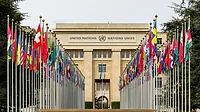Water: A Crisis of Governance, Says UN Water Report
Governance systems, it says, “determine who gets what water, when and how, and decide who has the right to water and related services.” Such systems are not limited to “government,” but include local authorities, the private sector and civil society. They also cover a range of issues intimately connected to water, from health and food security, to economic development, land use and the preservation of the natural ecosystems on which our water resources depend.
“Water, a shared responsibility,” is to be formally presented by the UNESCO Director-General, on behalf of the United Nations, to the Fourth World Water Forum in Mexico City on March 22, World Water Day.
Some report highlights:
- Estimates indicate that 1.1 billion people still do not have access to an adequate supply of drinking water and some 2.6 billion do not have access to basic sanitation. These people are among the world's poorest.
- Poor water quality is a key cause of poor livelihood and health. Globally, diarrheal diseases and malaria killed about 3.1 million people in 2002. Ninety percent of these deaths were children under the age of five. An estimated 1.6 million lives could be saved annually by providing access to safe drinking water, sanitation and hygiene.
- Water quality is declining in most regions. Evidence indicates that the diversity of freshwater species and ecosystems is deteriorating rapidly, often faster than terrestrial and marine ecosystems. The report points out that the hydrological cycle needs a healthy environment to function.
- Ninety percent of natural disasters are water-related events, and they are on the increase. Many are the result of poor land use. Two out of every five people now live in areas vulnerable to floods and rising sea levels. The nations most at risk include Bangladesh, China, India, the Netherlands, Pakistan, the Philippines, the United States and the small island developing states. The report stresses that changing climate patterns will further exacerbate the situation.
- The world will need 55 percent more food by 2030 This translates into an increasing demand for irrigation, which already claims nearly 70 percent of all freshwater consumed for human use. Food production has greatly increased over the past 50 years, yet 13 percent of the global population - 850 million people, mostly in rural areas - still do not have enough to eat.
- In many places of the world, 30 to 40 percent or more of water goes unaccounted for, through water leakages in pipes and canals and illegal connections.
- Although there are no accurate figures, it is estimated that political corruption costs the water sector millions of dollars every year and undermines water services, especially to the poor.
“Good governance is essential for managing our increasingly-stretched supplies of freshwater and indispensable for tackling poverty,” says UNESCO Director-General Koïchiro Matsuura. “There is no one blueprint for good governance, which is both complex and dynamic. But we know that it must include adequate institutions - nationally, regionally and locally, strong, effective legal frameworks and sufficient human and financial resources.”
It also requires “essential freedoms, like the freedom of speech and the right to organize,” says the report, which stresses that: “If citizens cannot access basic information on water quality and quantity, it seriously curtails their chances of halting environmentally unsound water projects or to hold relevant government agencies accountable.”
ND
Looking for a reprint of this article?
From high-res PDFs to custom plaques, order your copy today!





